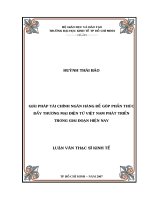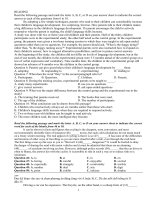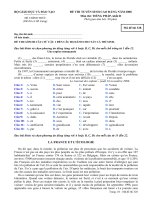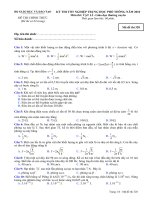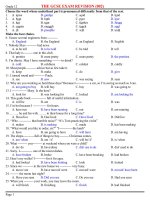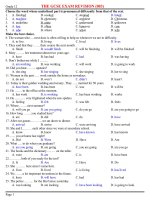GCSE 328
Bạn đang xem bản rút gọn của tài liệu. Xem và tải ngay bản đầy đủ của tài liệu tại đây (75.56 KB, 5 trang )
SƠ GD&ĐT VINH PHUC
TRƯƠNG THPT LIÊN SƠN
(Đề thi gồm: 05 trang)
ĐỀ KTCL ƠN THI THPT QUỐC GIA NĂM 20182019
Mơn: TIẾNG ANH – ĐỀ SỐ 328
Thời gian làm bài: 60 phút, không kể thời gian phát
đề
Ho va tên thi sinh:……………………………………………………………………. SBD:…………………………
Mark the letter A, B, C, or D on your answer sheet to indicate the underlined part that needs
correction in each of the following questions.
Question 01: Even though she looks very young, she is twice older than my twenty-year-old sister.
A. twenty-year-old B. older than
C. looks
D. Even though
Question 02: The teacher tried to make the classes enjoyable experiences for the students so they
would take a greater interest in the subject.
A. so
B. would take a greater
C. in the
D. tried to make
Question 03: Food prices have raised so rapidly in the last few months that some families have
been forced to alter their eating habits.
A. that
B. have raised
C. forced to alter
D. rapidly
Mark the letter A, B, C, or D on your answer sheet to indicate the word(s) CLOSEST in meaning
to the underlined word(s) in each of the following questions.
Question 04: He was a benevolent old man and wouldn't hurt a fly.
A. kind and helpful B. strict and rude
C. generous
D. sparing
Question 05: The janitor ran out and saw off the boys who had been damaging the fence.
A. cut into pieces
B. turned off
C. waved goodbye to D. sent away
Mark the letter A, B, C, or D on your answer sheet to indicate the word that differs from the
other three in the position of primary stress in each of the following questions.
Question 06: A. anecdote B. altitude
C. amnesty
D. analogy
Question 07: A. insulator B. innovate
C. intimacy
D. insomnia
Mark the letter A, B, C, or D on your answer sheet to indicate the word whose underlined part
differs from the other three in pronunciation in each of the following questions.
Question 08: A. anchorage B. heritage
C. coverage
D. massage
Question 09: A. capital
B. captain
C. capable
D. cabinet
Mark the letter A, B, C, or D on your answer sheet to indicate the word(s) OPPOSITE in
meaning to the underlined word(s) in each of the following questions.
Question 10: Her thoughtless remark cut him to the quick.
A. took his fancy
B. pulled his leg
C. had him bleed
D. displeased him
Question 11: She can't accept even mild criticism of her work.
A. easy
B. severe
C. hard
D. soft
Mark the letter A, B, C, or D on your answer sheet to indicate the sentence that best combines
each pair of sentences in the following questions.
Question 12: Strangely enough, more and more people rushed to buy gold. The price was reported to
have been falling.
A. There is a strange report that more and more people rushed to buy gold as its price was
falling.
B. I found in a strange report that more and more people rushed to buy gold for its price
was falling.
C. It was quite strange that more and more people rushed to buy gold while its price was
reported to have been falling.
D. More and more people rushed to buy gold because its price was reported to have been
strangely falling.
Question 13: I forgot to send roses on her birthday. I apologised to her for it.
A. I apologised to her for not having sent her roses on her birthday.
B. I apologised for not sending roses to her on her birthday.
C. Not having sent her roses on her birthday was my excuse.
D. I was sorry for not to have sent her roses on birthday.
Read the following passage and mark the letter A, B, C, or D on your answer sheet to indicate
the correct answer to each of the questions from 14 to 20.
SENSE AND SENSIBILITY
Two delightful evening walks in thick wet grass had given Marianne a violent cold. She felt
heavy and feverish, with pains all over her body, but at first refused all medicines, saying that a
good night’s rest was all that she needed.
The next day, however, she was worse, unable to do anything except lie miserably on a
sofa, and after another restless, feverish night, Elinor was very ready to send for the Palmers’
doctor. After examining his patient, he said that she was suffering from an infection, and would
recover in a few days. But the word 'infection' greatly alarmed Mrs. Palmer, who feared that her
baby might catch it, and she persuaded her husband to take her and the child to stay with a near
relation, until there was no further danger of illness at Cleveland. Mrs. Jennings kindly insisted on
staying with the Dashwoods, as she felt responsible for the young ladies in their mother’s absence,
and Colonel Brandon also offered to stay, in case a gentleman’s help was needed. Poor Marianne
now felt really ill, and extremely miserable, as their return to Barton would have to be
considerably delayed.
Several days passed, and Marianne’s condition remained the same. The doctor came every
day, talking each time of a speedy recovery, and Elinor was just as hopeful. In her letters home, she
had not told her mother of the seriousness of Marianne’s illness, and now congratulated herself on
not alarming Mrs. Dashwood unnecessarily. But that evening, Marianne became restless again, and
Elinor stayed beside her bed, watching her turning feverishly from side to side.
Suddenly Marianne sat up and cried wildly, 'Is mama coming?'
'Not yet,' replied Elinor, hiding her terror, and helping her sister lie down again. 'It is a long
way from Barton.'
'But she must come soon!’ cried Marianne desperately.'
'I shall never see her again if she does not come soon!'
Elinor was so alarmed that she sent for the doctor at once, and decided to send a
messenger to Barton to fetch her mother. She spoke immediately to Colonel Brandon, who,
although greatly depressed and fearing the worst, was ready to help in any way, and offered to
drive to Barton himself. How grateful Elinor was for the comfort of such a friend as the colonel at
that moment! Not a second was lost in delay of any kind, and the colonel drove off into the night,
leaving Elinor to watch over her sister.
Both sisters suffered greatly during that night, Marianne in her sleepless pain and fever,
and Elinor in cruel anxiety that her mother would arrive too late to see her dead child alive. When
the doctor came, he had to confess that his medicines had failed, and that the infection was
stronger than ever. Elinor was calm, except when she thought of her mother, but she was almost
without hope. She stayed by her sister’s bed all morning, her thoughts confused and sorrowful.
But at midday, she began to see signs of the fever going down. Cautiously, she told herself
not to hope, but soon it seemed almost certain, and on the doctor’s next visit, he was able to
congratulate her on Marianne’s slow but sure recovery. Mrs. Jennings showed her delight by
talking and laughing without stopping, but Elinor’s feelings were of a different kind. Her relief and
happiness were strong, but silent. That evening Marianne fell into a quiet, comfortable sleep, and
Elinor knew that at last she was out of danger.
Her thoughts now began to turn to her mother’s arrival, which was expected at any
moment. Mrs. Jennings persuaded her to leave Marianne’s bedside for a few minutes to drink
some tea, but Elinor soon returned, to sit by her sleeping sister and wait for the travellers from
Barton.
The night was cold and stormy, but as long as Marianne slept peacefully, Elinor did not
mind the beating of the rain on the windows, or the noise of the wind blowing around the house.
At eight o’clock she heard a carriage drive up to the front door. Knowing what her poor mother
must be feeling, Elinor found it impossible to be calm, and hurried downstairs. She rushed into the
sitting-room and saw - Willoughby.
With a look of horror, she stepped backwards, and was about to leave the room, when he
said rapidly, 'Miss Dashwood, I beg you to stay. I have something I must tell you.'
[Adapted from “SENSE AND SENSIBILITY” by Jane Austen]
Question 14: Mrs. Palmer decided to leave her home________
A. as soon as her child was feeling better.
B. because of what the doctor had said.
C. in spite of her husband's advice.
D. to visit a family member who was unwell.
Question 15: From the third paragraph we understand that________
A. Marianne was improving due to the doctor's treatment.
B. Elinor was pleased that her mother didn't know about Marianne's illness.
C. Elinor believed her sister would soon get better.
D. Marianne did not want to see her mother.
Question 16: The phrase fearing the worst suggests that Colonel Brandon________
A. believed that Mrs. Dashwood would not be able to come.
B. was afraid that the journey to Barton would take too long.
C. thought that Marianne might not live.
D. felt more upset about the situation than Elinor.
Question 17: What worried Elinor most about her sister's illness?
A. She did not think that the doctor was reliable. B. Marianne was not often awake.
C. She could not decide on the best thing to do. D. Her mother might not arrive soon
enough.
Question 18: Elinor was not sure that Marianne would recover until________
A. she had fallen asleep.
B. the medicine had worked.
C. the doctor had reported his conclusions.
D. she had spoken to Mrs. Jennings.
Question 19: The word “miserably” is closest in meaning to________
A. pitiful
B. very uncomfortably
C. poor
D. sorrowful
Question 20: After entering the sitting room, Elinor________
A. was keen to hear what the visitor wanted to say.
B. felt sorry that she had contacted her mother.
C. wished she had not left Marianne so quickly. D. was shocked by what she discovered.
Read the following passage and mark the letter A, B, C, or D on your answer sheet to indicate
the correct answer to each of the questions from 21 to 27.
The UK has a vast variety of higher education opportunities to offer students with over 100
universities offering various degree programs for students from the UK and around the world. In
the UK about one-third of all students go on to some forms of higher education and this number is
well over 50% for students from Scotland. This makes competition for places very fierce and so it
is advised to apply early for courses.
In the UK most undergraduate degree programs take three years to finish; however, the
"sandwich course" is increasing in popularity, which is four years and involves one year in the
work place (normally in your third year). In Scotland the courses are four years in length for
undergraduate programs.
For graduate or masters programs, they are generally shorter in length and undertaken
after graduation of your undergraduate program. Some professional degrees like medicine,
veterinary, law etc. have longer programs that can be as much as five years.
From 2007, universities in the UK are allowed to charge students from the UK up to £3,070
per year (depending on the school and location). For students from the EU, you will also only have
the pay the same fees as students from the UK, but international students from the rest of the
world will have to pay the full school fees which will vary depending on the school. These fees for
international students can range anywhere from £4,000 per year right up to £18,000 per year or
more.
(Source: />Question 21. According to the passage, what is the number of the students in the UK attending
higher education?
A. About 50 percent B. About 33 percent C. About two-thirds D. About more than half
Question 22. It can be inferred from the passage that________
A. Students from the UK are charged up to £3,070 per year depending on the school and
location.
B. International students (except from the EU) have to pay the full school fees which vary
depending on the school.
C. A Vietnamese student has to pay from £4,000 to £18,000 a year or more to study at a
university in the UK.
D. Students from the EU pay no more than £3,070 a year to study at a university in the UK.
Question 23. The word "professional" in paragraph 3 is closest in meaning to________.
A. relating to a sport B. having lots of skills C. relating to a job D. having experience
Question 24. The word "fierce" in paragraph 1 is closest in meaning to________.
A. angry
B. tough
C. strong
D. violent
Question 25. What does the passage mainly discuss?
A. Undergraduate programs in the UK
B. Higher education in the UK
C. Tuition fees of higher education in the UK
D. Education system in the UK
Question 26. According to the passage, it takes________ to get a master degree in the UK after
graduating from high school.
A. from 3 to 4 years
B. from 6 to 9 years C. from 3 to 5 years D. over 9 years
Question 27. The word "they" in paragraph 3 refers to________.
A. Undergraduate programs
B. University graduates
C. University courses
D. Postgraduate programs
Read the following passage and mark the letter A, B, C, or D on your answer sheet to indicate
the correct word or phrase that best fits each of the numbered blanks from 28 to 32.
HOW POLITE ARE THE BRITISH?
An old stereotype suggests that the British are polite, but have you (28)________ asked
yourself whether that’s really true? Imagine two situations: in the first, you are (29)________ for a
bus, when someone walks into you; in the second, you have just sat down on the Tube, when the
person next to you stands on your foot as they are getting up. Who should say sorry - you, or the
person who made the mistake? In most countries, it would be the person (30)________ for the
mistake. However, it’s (31)________ more likely in the UK that both you and the person who made
the mistake would apologise to each other! Why? The (32)________ may come from a recent survey
in a national newspaper which found that people tend to use the word ‘sorry’ automatically and
most admit to never meaning it at all. Perhaps the British are not as polite as we might think after
all!
Question 28: A. before
B. yet
C. never
D. ever
Question 29: A. waiting
B. looking
C. standing
D. expecting
Question 30: A. charged
B. dishonest
C. responsible
D. wrong
Question 31: A. far
B. less
C. the
D. better
Question 32: A. explanation
B. motive
C. notice
D. example
Mark the letter A, B, C, or D on your answer sheet to indicate the correct answer to each of the
following questions.
Question 33: How do we know what___________ universe is supposed to look like?
A. a
B. an
C. the
D. Ø
Question 34: Only those with parking________ are allowed to park in this area.
A. permits
B. lots
C. licenses
D. receipts
Question 35: All students are welcome to________ on the day before classes start.
A. take
B. apply
C. enroll
D. enlist
Question 36: Prehistoric people made paints by grinding colored materials________ into powder
and adding water.
A. if vegetation and clay
B. that vegetation and clay are
C. how vegetation and clay
D. such as vegetation and clay
Question 37: The concept of television, ________ images over distances, had intrigued scientists
even before the invention of moving pictures or radio.
A. the transmitting B. for transmission
C. the transmission of D. transmits to
Question 38: The Louisiana Territory, an area________ the size of France, was bought by the United
States from France for $15,000,000 in 1803.
A. than more four times
B. more than four times
C. is four times more than
D. four times than more
Question 39: Many gases, including the nitrogen and oxygen in the air, ________ colour or odour.
A. they do not have B. have no
C. not having D. which have no
Question 40: The onion is characterized by an edible bulb composed of leaves rich in sugar and a
pungent oil, ________ the vegetable’s strong taste.
A. which the source of
B. the source of
C. of the source is
D. that the source is
Question 41: The dormitories maybe________ in undergraduate summer courses
A. engaged
B. filled
C. occupied
D. taken
Question 42: Library books may be renewed if they haven’t been________ by someone else.
A. requested
B. ordered
C. expected
D. asked
Question 43: The child was not________ for breaking the window. He was let off with a warning.
A. accused
B. exposed
C. revealed
D. punished
Question 44: The committee was________ of members of the union.
A. consisted
B. conscious
C. composed
D. collected
Question 45: The company cannot afford to buy new machinery this year because they are on a
fixed________.
A. price
B. budget
C. account
D. income
Mark the letter A, B, C, or D on your answer sheet to indicate the sentence that is closest in
meaning to each of the following questions.
Question 46: Using my iPad is not allowed until I finish my homework.
A. Not until do I finish my homework that using my iPad is allowed..
B. Not before I have finished my homework am I permitted to use my iPad.
C. I am not allowed to use my iPad after I have finished my homework.
D. My parents do not let me use my iPad until I finish my homework.
Question 47: He has had a lot of success in his career to date.
A. His career has got him much success so far.
B. More than ever he is successful in his career.
C. Today he’s got great success in his career.
D. His career has been greatly successful up to now.
Question 48: Music festivals are popular and they usually occur in the summer.
A. What usually takes place in summer are music popular festivals.
B. The music festivals which are popular usually happen in summer.
C. Music festivals, which usually take place in the summer, are popular.
D. What is often popular in summer are the music festivals.
Mark the letter A, B, C, or D on your answer sheet to indicate the sentence that best completes
each of the following exchanges.
Question 49: ~ Kathy: “__________” ~ Linda: “Not to my taste. I often get scared watching that stuff.”
A. Have you bought the new album “Reputation” by Taylor Swift?
B. You really don’t like Diana Ross?
C. Why don’t you try this perfume?
D. You aren’t fond of those films, I think.
Question 50: ~ Bane: “What do you think of this city?” ~ Cline: “__________”
A. Not too bad, but I can’t find it on the menu.
B. I live far from it. Often taking 50 minutes to reach home.
C. I like it, but I sometimes feel a bit homesick.
D. Classes start at 7 and I never miss one.
_________THE END__________

